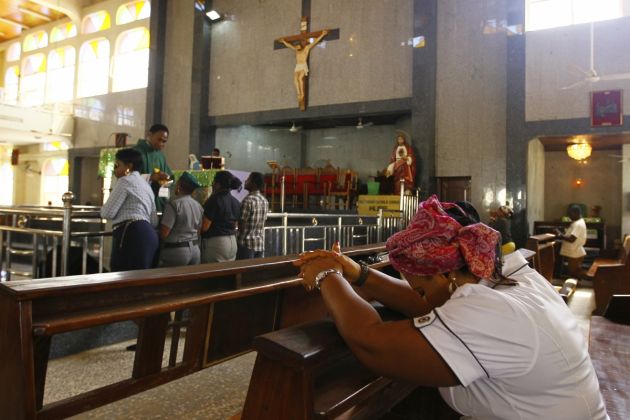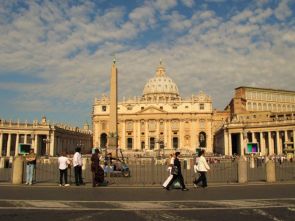With world turning virtual during COVID-19 crisis, it's easy to pray

People pray daily for an end to the coronavirus-COVID-19 that is gripping the world, turning human interaction into a virtual affair and upending lives everywhere during a struggle against a silent enemy about which little is known.
Churches, mosques, synagogues and temples have shut their doors in every corner of the planet following the spread of COVID-19. The virus strain was first identified in Wuhan, in China in December 2019.
Praying is something that does not need social contact as global Christian groups, including the World Council of Churches, the Vatican, and the World Evangelical Alliance, have noted.
As in all struggles, COVID-19 brings out the good and the bad in humanity, with health workers engaging in great sacrifices and others rushing to help as some show prejudices against people from accused of being the bearers of the disease or those who are vulnerable.
Pope Francis has said he will hold Easter mass without public for first time as Italy struggles with nearly 32,000 cases and more than 3,500 deaths.

COVID-19 PRAYER
WCC member church, The United Church of Canada posted "A Prayer During Times of COVID-19."
It reads partially, "In this time of COVID-19, we pray: When we aren't sure, God, help us be calm;
when information comes from all sides, correct and not, help us to discern; when fear makes it hard to breathe, and anxiety seems to be the order of the day, slow us down, God;
help us to reach out with our hearts, when we can't touch with our hands; help us to be socially connected, when we have to be socially distant;
help us to love as perfectly as we can, knowing that "perfect love casts out all fear."
World Health Organization director-general Dr Tedros Adhanom Ghebreyesus added some perspective at a press conference on 13 March when he said that despite the new pandemic, the WHO's work continues and the world goes on.
'BABIES STILL BEING BORN'
"Babies are still being born. Essential surgery is continuing. People still need emergency care after road traffic crashes. People still need treatment for cancer, diabetes, HIV, malaria, and many other diseases," said Tedros.
Looking ahead, the WCC in Geneva, Switzerland, had on Feb. 28 canceled an important meeting of its Central Committee, one of its main governing bodies, in March and at the end of last week, took strong measures to prevent the spread of COVID 19.
"This situation calls on our solidarity and accountability, mindfulness, care and wisdom," said WCC general secretary Rev. Olav Fykse Tveit, on March 13. "This situation also calls for our signs of faith, hope, and love," he wrote.
"We need one another now as colleagues and friends to support one another in the reorganizing of our work, but also we need one another's support, mentally and spiritually."
Switzerland is one of the countries most affected by the coronavirus, at the epicentre moved to Europe last week with at least 2,200 people testing positive and 18 deaths as of 16 March in the Alpine country.
In Geneva, the city of Jean Calvin, Protestant, and Roman Catholic churches had their doors shut for Sunday services.
One woman who identified herself as a committed Christian said, "We must try to have balance in the way we react. As believers, this is an opportunity to shine in the middle of the storm by being calm and measured."
On March 18, there were over 198,000 cases of COVID-19 in the world with nearly 8,000 deaths since December.
In Asia, due to the pandemic, the Christian Conference of Asia said that its theme for Asia Sunday-2020 is "God, Heal Us as We are Vulnerable'."
Asia Sunday is observed by Christian Conference of Asia member churches generally on the Sunday before Pentecost, which falls this year on 24 May.
However, the Christian Conference of Asia requested its member churches and councils to use the Asia Sunday liturgy during special prayers in the coming days for the victims of the pandemic COVID-19.
Dr Mathews George Chunakara, Christian Conference of Asia general secretary, stated: "The crucial conditions which we are currently collectively undergoing is a reminder for humankind to reflect on the fragility of human life and the ultimate vulnerability of the entire cosmos!"
Africa has the lowest and slowest rates of COVID-19, but the disease is seeping in. WHO officials have expressed fears about the ability of the health systems of poor countries on the continent to deal with the pandemic.
WORRIES FOR AFRICA
The three living Archbishops of the Anglican Church of Southern Africa Archbishop Emeritus Desmond Tutu, Archbishop Emeritus Njongonkulu Ndungane and Archbishop Thabo Makgoba issued an unprecedented joint statement appealing to people across Southern Africa to beat the coronavirus by working closely together.
"The virus has no boundaries – it cuts across all communities, rich and poor, in north, south, east and west. Only mutual love and care for one another will get us through the crisis," they said.
Thabo Makgoba had said two days earlier he was "desperately worried" that South Africans - and people throughout Africa – were not taking the coronavirus seriously enough.
He observed that Africans would treat the virus as "a European problem," and not an African problem.
"Viruses do not have passports; they don't know borders; they don't respect race or colour."
He also said he feared that "a lot of people will be affected" if the virus spreads in South Africa, with its high incidence of HIV and Aids and tuberculosis.
In the United States, the president and general secretary of the U.S. National Council of Churches, Jim Winkler wrote a message on March 13.
"Every day, I have conversations with people about the coronavirus. It seems everybody has a theory about the virus or how to treat it or how to avoid it. The news leads with the latest about the spread of the virus. Daily, it creeps closer to where I live and work. It feels like a science fiction novel or movie is unfolding in real life."